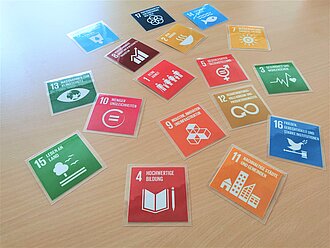What is ESD?
Background information
What is ESD?
Education for sustainable development (ESD) refers to education that enables people to understand the impact of their own actions on the world and to make responsible, sustainable decisions based on the careful use of the earth's ecological, economic and social resources.
In terms of ESD, the knowledge, skills and abilities required for the free development of the personality and for helping to shape a constantly changing society should be trained. These central competences of ESD are also referred to as design competences. These include the ability to deal with complex, incomplete or contradictory information, which is omnipresent in our fast-moving, globalised world. Interdisciplinary cooperation, critical thinking, empathy and changing perspectives are also part of design skills.
The 17 Sustainable Development Goals (SDGs), which were passed by the United Nations in 2015 as part of the global sustainability agenda - also known as "Agenda 2030" - are of central importance in the context of ESD. Education plays a central role in the implementation of the sustainability agenda and national action plans have been drawn up based on the UNESCO roadmap. According to the National Action Plan for Germany, ESD should therefore be firmly anchored in all areas of the education system. The areas of education include: Early childhood education, school, vocational education, higher education and non-formal or informal education.







